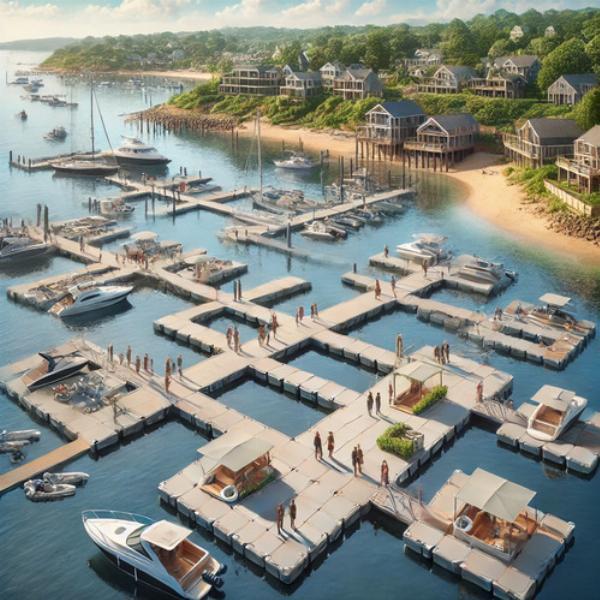Floating Docks: A Versatile Solution for Coastal Communities

Strong 8k brings an ultra-HD IPTV experience to your living room and your pocket.
Floating Docks Market have emerged as a flexible and innovative solution for coastal communities, offering adaptability and functionality across a wide range of applications. Whether utilized for recreational boating, fishing or industrial purposes, floating docks offer a sustainable and versatile option that meets the diverse requirements of waterfront areas. As coastal regions encounter environmental shifts and increasing demand for marine infrastructure, floating docks serve as a dynamic alternative to traditional fixed structures.
What Are Floating Docks?
Floating docks are buoyant platforms that sit atop the water's surface, securely anchored to the shore or seabed with flexible mechanisms like chains or poles. Unlike fixed docks that are permanently embedded in the seabed, floating docks move with tidal changes, maintaining a consistent height relative to the water. Typically made from durable materials such as polyethylene, aluminum or concrete, they are designed to withstand the harsh conditions of marine environments.
Key Benefits of Floating Docks
Adaptability to Water Level Variations: A major advantage of floating docks is their ability to adjust to changing water levels, making them highly suited for regions with significant tidal fluctuations. This flexibility ensures that vessels can dock safely regardless of tide conditions, eliminating the need for height adjustments or structural modifications.
Ease of Installation and Mobility: Compared to traditional fixed docks, floating docks can be installed quickly, requiring less underwater construction. Additionally, they can be easily relocated or expanded, allowing coastal communities to modify their infrastructure as needed.
Cost-Effectiveness and Environmental Friendliness: Floating docks do not necessitate deep foundation work or heavy construction, often making them more affordable to install. Their design also has a lower environmental impact as they cause minimal disruption to the seabed, helping preserve local ecosystems.
Durability and Longevity: Built to endure rough weather, including waves, storms, and icy conditions in colder regions, modern floating docks are highly durable, making them a reliable option for both recreational and industrial uses.
Applications for Coastal Communities
Recreational Boating and Marinas: Coastal communities that depend on tourism or recreational boating benefit from floating docks, which provide easy water access for vessels of all sizes. These docks can be expanded during peak seasons to meet increased demand.
Fishing and Aquaculture: Floating docks offer a stable platform for commercial fishing operations and aquaculture farms, making it easier to load and unload catches or maintain fish cages. They can also be installed in remote areas to support local fisheries.
Disaster Relief and Emergency Services: In regions vulnerable to storms or flooding, floating docks play a crucial role in disaster response. They can function as temporary platforms for emergency response teams, assist in evacuations, or serve as hubs for distributing relief supplies.
Challenges and Considerations
While floating docks offer numerous advantages, there are some challenges to address. Effective anchoring and mooring systems are essential to ensure stability during harsh weather conditions. Coastal communities must also assess environmental regulations and ensure that floating docks do not interfere with local wildlife habitats or protected areas.
The Future of Floating Docks in Coastal Areas
As sea levels rise and extreme weather events increase due to climate change, coastal communities will need adaptable and resilient infrastructure solutions. Floating docks provide a flexible option that addresses these challenges, while delivering economic and environmental benefits.
With ongoing advancements in materials and technology, floating docks will continue to evolve, offering even more innovative solutions for waterfront infrastructure. Coastal communities can utilize these structures to enhance marine access, stimulate local economies, and protect the environment for future generations.
In conclusion, floating docks represent a highly versatile and practical solution for the unique needs of coastal regions, providing long-lasting value and adaptability in an ever-evolving marine landscape.
Note: IndiBlogHub features both user-submitted and editorial content. We do not verify third-party contributions. Read our Disclaimer and Privacy Policyfor details.






